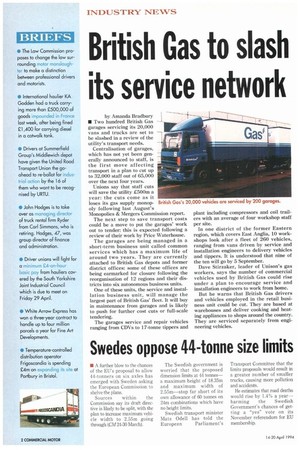British Gas to slash its service network
Page 6

If you've noticed an error in this article please click here to report it so we can fix it.
by Amanda Bradbury • Two hundred British Gas garages servicing its 20,000 vans and trucks are set to be slashed in a review of the utility's transport needs.
Centralisation of garages, which has not yet been generally announced to staff, is the first move affecting transport in a plan to cut up to 32,000 staff out of 65,000 over the next four years.
Unions say that staff cuts will save the utility £500m a year: the cuts come as it loses its gas supply monopoly following last August's Monopolies & Mergers Commission report.
The next step to save transport costs could be a move to put the garages' work out to tender: this is expected following a review of their work by Price Waterhouse.
The garages are being managed in a short-term business unit called common services which has a maximum life of around two years. They are currently attached to British Gas depots and former district offices: some of these offices are being earmarked for closure following the reorganisation of 12 regions and their districts into six autonomous business units.
One of these units, the service and installation business unit, will manage the largest part of British Gas' fleet. It will buy in maintenance from garages and is likely to push for further cost cuts or full-scale tendering.
The garages service and repair vehicles ranging from CDVs to 17-tonne tippers and plant including compressors and coil trailers with an average of four workshop staff per site.
In one district of the former Eastern region, which covers East Anglia, 10 workshops look after a fleet of 260 vehicles, ranging from vans driven by service and installation engineers to delivery vehicles and tippers. It is understood that nine of the ten will go by 5 September.
Dave Stirzaker, leader of Unison's gas workers, says the number of commercial vehicles used by British Gas could rise under a plan to encourage service and installation engineers to work from home.
But he warns that British Gas drivers and vehicles employed in the retail business unit could be cut. They are based at warehouses and deliver cooking and heating appliances to shops around the country. They are serviced separately from engineering vehicles.


























































































